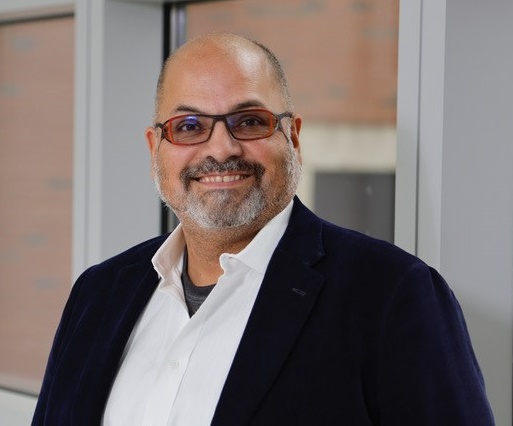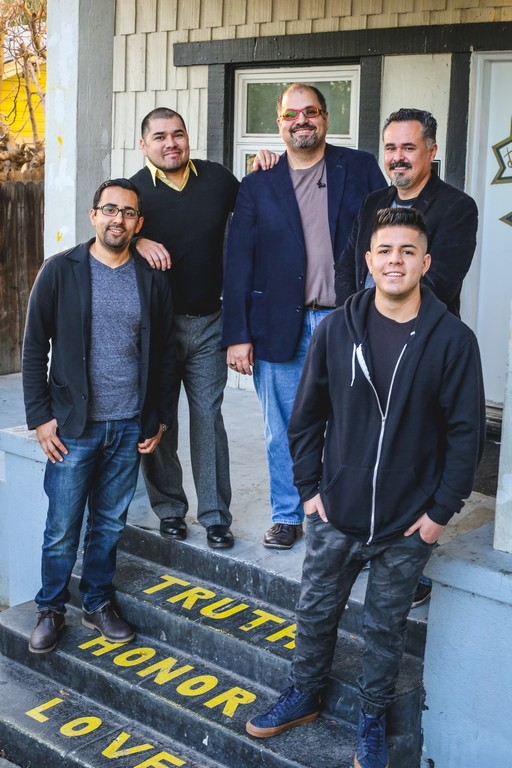Dr. Timothy Huerta Tackles COVID and Chaos
 When compared among nationally recognized professors and medical science researchers, Timothy Huerta, Ph.D. (Cal State LA) stands out among his peers. Currently the Associate Dean of Research Information Technology and Chief Research Information Officer for the Ohio State University College of Medicine and the Wexner Medical Center, he also leads an industry-university partnership from the National Science Foundation, provides strategic data to the Patient-Centered Outcomes Research Institute, and oversees a Healing Communities Study focused on reducing Opioid-related deaths in Ohio.
When compared among nationally recognized professors and medical science researchers, Timothy Huerta, Ph.D. (Cal State LA) stands out among his peers. Currently the Associate Dean of Research Information Technology and Chief Research Information Officer for the Ohio State University College of Medicine and the Wexner Medical Center, he also leads an industry-university partnership from the National Science Foundation, provides strategic data to the Patient-Centered Outcomes Research Institute, and oversees a Healing Communities Study focused on reducing Opioid-related deaths in Ohio.
While the responsibilities and titles are impressive, he views his work from the servant leader perspective he learned as his chapter Commander in Sigma Nu. "My job now is to help the university be ready for where it needs to be in three years," he says, "And not just where we need to be now."
Huerta effectively filled that role during the onset of COVID-19 and in the subsequent years since.
COVID – Calculations and Complications
In January of 2020, as the coronavirus began its march across the United States, hospital admissions were on the rise, with patients suffering from severe respiratory distress. Huerta saw there were no treatments, no tests, and few answers.
By March 2020, universities from around the world, including OSU, were working with the Centers for Disease Control and Prevention (CDC) and other agencies to establish a test to identify COVID-19. But there was a glitch. Labs in research settings are set up differently than in emergency rooms, so tests built in university laboratories do not work in hospitals.
"No pathways existed to get test results from sequencer to hospital and on to the health officials that needed it," explained Huerta.
What was needed was someone who understood both healthcare and scientific laboratories and how to close the gap between the two. Huerta knew how to fill that need.
In the early 2000s, his first post-doctorate job was with the US National Cancer Institute in Vancouver, Canada. He focused on the dynamics behind why people smoke, along with healthcare and epidemiology (the study of diseases) implications. Although his work was complex, Huerta sums it up as "implementation science." The goal was to figure out how to get people to do what they know they need to do - like stop smoking.
Huerta spent time researching how to help healthcare systems create collaborative networks by breaking down silos of information and resources to ensure patients had access to what they needed. "Getting people connected to doctors, and the doctors connected to other doctors, so they knew how to treat people was a big [focus] for me," said Huerta, who in 2006 was named the first National Science Foundation's faculty fellow to the National Center for Supercomputing Applications.
His knowledge of data and system applications was in high demand in the academic world. In 2013, after several years as a tenured professor at Texas Tech University, he was recruited to the Ohio State University with the mission of building a new program in health services research in the College of Medicine. "The opportunity to design systems and protocols that could directly impact peoples' lives was too much to pass up," Huerta said.
He began researching how people use information technology, including social media, to make decisions about their healthcare and how hospitals use technology to help individuals manage patient care. Huerta's work and connections would prove crucial in the coming years as his research grew increasingly entwined with healthcare systems.
At the onset of COVID-19 in early 2020, few people understood how to assemble the technologies necessary to help the science, technology, and healthcare sectors respond. On the other hand, Huerta had spent his entire academic life understanding how people and technology needed to intersect. At OSU, he put that knowledge to work amid a global pandemic.
"We quickly put together a small team and began the process of figuring out how to create a COVID lab," Huerta said, welcoming the opportunity to use his scientific background, data analytics toolkit, and team-building skills to help so many who felt helpless.
His knowledge of writing computer code was an added – and rare – skill among medical researchers, which helped expedite the creation of labs for COVID testing. The team had the first lab ready for the university hospital within weeks. A few months later, he helped open a second lab to help the university test students in-house – saving millions of dollars.
His work on the large-scale COVID response is not something he had imagined for himself when he began his career. "I didn't start with an interest in medicine," said Huerta, "…but my post-doctorate [work] really did tee that up."
He is now a nationally recognized expert on issues related to healthcare productivity and process analysis. "I do a lot of work that's really at the intersection of information technology, economics, and healthcare delivery," he said.
A Love of Learning at an Early Age
Huerta's story embodies the American Dream and the rewards of hard work. Growing up in working-class Maywood, California, on the outskirts of Los Angeles amidst commercial warehouses and slaughterhouses, he described his family as similar to so many around him. "My grandparents are all first-generation Americans who immigrated from Mexico," he said. "My grandmother was a single mom who worked in a bakery making tortillas, and my grandfather worked in the fields." Huerta's parents were modestly middle-class and worked hard to encourage their son's passion.
As a young child, Huerta's reading level was well beyond his peers. His parents made sure books were readily available and encouraged his desire to explore new subjects. Instead of playing little league ball or neighborhood street hockey, Huerta was happiest learning about everything there was to know about everything he could. At age 12, he became the third-youngest person to be accepted to college in the state of California. When his friends were graduating from middle school, he was working on a bachelor's degree in chemistry.
Ever humble, Huerta says it was simply the path he was walking, one step at a time. He describes his passion for learning as "self-motivation and my inspiration…I never wanted to be bored."
Second Undergrad – A Road Less Traveled
Huerta's academic path was not without setbacks, course corrections, and U-turns.
When his application to enter the doctoral program at UCLA was denied - despite having completed his bachelor's degree at age 17 – Huerta found himself without an academic plan for the first time in his life. "It didn't dawn on me that I wouldn't get accepted to the program," he said. "I hadn't actually made any other plan." But the initial disappointment opened new doors.
Huerta found himself back at Cal State LA, years ahead academically than others his age, one degree down, and exploring new paths. "When I didn't get into UCLA, I decided to re-live what I missed [growing up]," said Huerta. "I went back to college and pledged a fraternity."
Over the next four years, he added academic specializations in biochemistry, biophysics, and mathematics to the degree he had already completed, along with minors in theater arts and computer science. "I know way too much about things that you would never know I know," he says, laughing. "I think I'm six classes away from all the degrees."
Huerta initially set his sights on the "hard sciences (chemistry, biology, etc.)" and being a biochemistry professor, but soon felt pulled to challenges in a different field. He was intrigued by the idea that social science was, in fact, the harder science. The renowned professor John Holland had come to campus to talk about "chaos theory," discussing how you can't control the experiment in social science because you can't control people. Huerta was instantly drawn to the idea of non-controllable experiments. "It's like building a chemistry lab out in the field where you can't adjust for the elements like you can in the lab," said Huerta. "You can't isolate stuff… it's hard work…and I thought, 'I can do hard work.'"
He would go on to earn master's degrees in public policy and political science, along with doctoral degrees in organizational theory, organizational behavior, and public management.
The Sum of All Things
Huerta's connection to both his pledge brothers and the Fraternity is enduring. He served as Commander of the Eta Phi Chapter at Cal State LA and has remained in close contact with many of his Sigma Nu brothers, both from his chapter and those he met along the way. At the national level, Huerta served as Vice Regent on the High Council of Sigma Nu for six years and is the Cal State LA Housing Corporation's only lifetime member.
When asked why Sigma Nu holds such a special place in his heart, he recollects the words of his Lieutenant Commander from 25 years ago, David Galaviz, who explained his perspective on the letters that make up Sigma Nu. "When you combine the Sigma, the mathematic symbol for the sum, and Nu, which reflects the list of all things, Sigma Nu can be understood as the sum of all things."
Huerta said his life still centers around the brothers of Sigma Nu, and he gets together with them as often as possible. "Sigma Nu is very much central to my life…and I am happily bound together in all those relationships," he said.
As far as his lifelong pursuit of knowledge, Huerta said the journey has no end.
"I feel like knowledge is a mountain to climb. It's big, and I sometimes I have to go slowly. I never really know which route I'm going to take, or what the next thing is over the rise, but I'm curious, and there is only one way to go. And that's up."

Dr. Tim Huerta (center) with Eta Phi Chapter brothers. This photo was taken by Yemi Kuku and originally appeared in the Summer 2017 issue of The Delta.